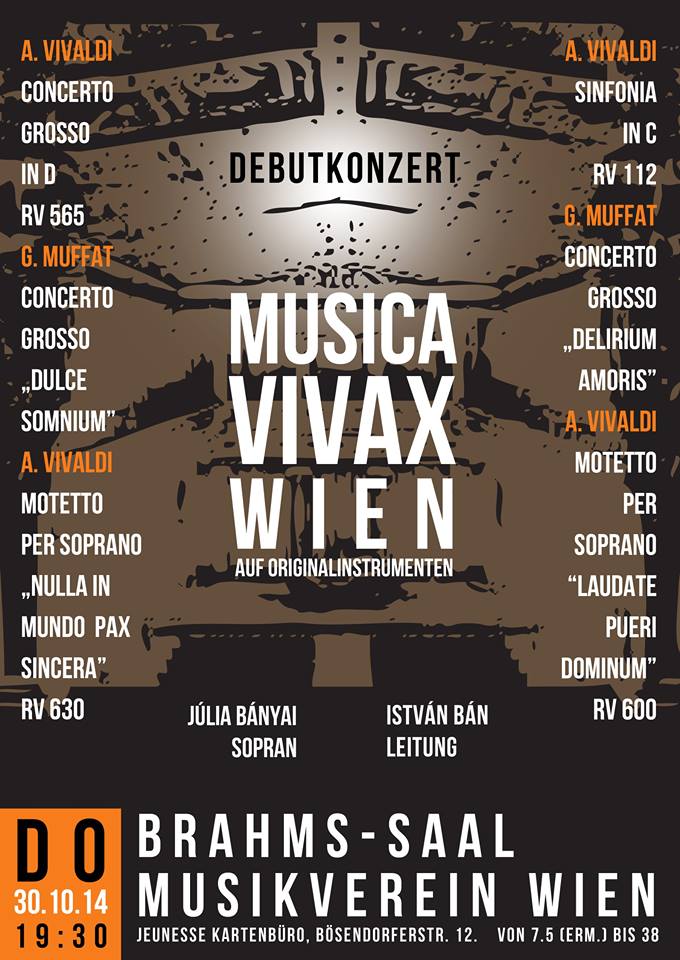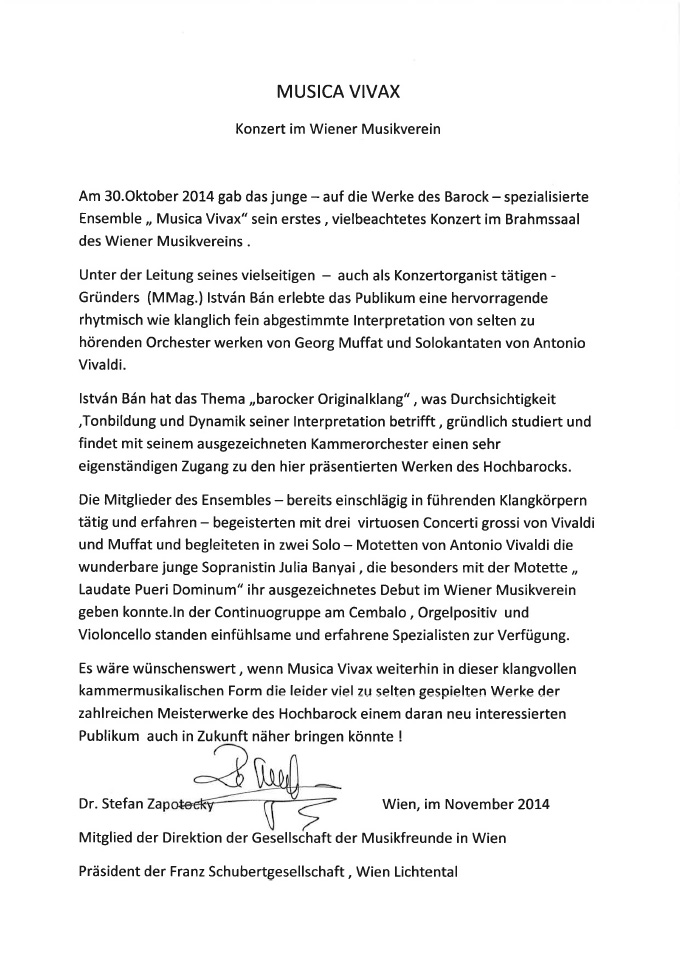Musica Vivax Wien
- on period instruments -
In search of a name for a new ensemble performing internationally that puts a great emphasis on clarity, dynamics, colourfulness and the profound message of music we came across Musica Vivax. The numerous meanings of the term perfectly match the ensemble's idea of interpreting music: “the power of music”, “the power in music”, and “the vital energy flowing from music”.
Obviously, music cannot be reinvented, but a number of things can be redefined - and an ensemble pooling the best musicians of the new generation is likely to pave the way for special and new productions. Apart from cultivating the tradition of Harnoncourt in the historic style of performance, we also intend to pursue our own, new courses and to spare no effort to go to the limits of what can be achieved in terms of playing music.
To our advantage, our members work a lot with leading modern symphonic orchestras and distinguished conductors (e.g. Abbado, Haitink, Harnoncourt, Pinnock, Norrington, Hengelbrock, Gardiner) and at the same time have experience with renowned “historic” ensembles (Concentus Musicus, Concerto Köln, Wiener Akademie, Freiburger Barockorchester, Balthasar Neumann Ensemble etc.). As a result, we apply a variety of experience and knowledge in our work and complete it with the joy of making music.
In the first place, we aim at representing pure music, at rendering its clear message without mannerisms by exploiting the full potential of articulation, vibration, emotion and dynamics. We are aware that large entities can only be understood and interpreted by meticulously working out every detail.
What is important to us is to produce a vivid, clear and transparent sound that is as close as possible to the composer's text in order to amalgamate his intentions with our emotions in an ideal way.
Of particular interest to us are rarities that are performed infrequently and not only reflect the diversity of the nationalities of our members, but also provide for variety and depth that correspond to our musical and interpreting concepts. Thus, in addition to the “great” composers we would also like to focus on the works of, for example, Georg Muffat and Tomaso Albinoni, or the pieces for choir and orchestra by Dietrich Buxtehude and Vincent Lübeck.
Musical Directors
István Bán
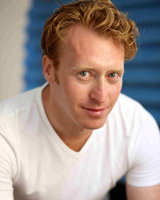
The period instrument ensemble, Musica Vivax Wien, comprises a young generation of musicians renowned throughout numerous baroque ensembles and symphonic orchestras. It is conducted by István Bán, who after completing his studies in Hungary, among other things in molecular genetics, moved to Vienna to further his musical pursuits. There he studied church music and organ performance by Peter Planyavsky, and choral and orchestral conducting by Erwin Ortner and Jordi Casals. He regulary performes all over Europe. During his long membership at the Arnold Schoenberg Choir which is directed by his professor, he absorbed the skill of authentic interpretation from Nikolaus Harnoncourt who made a great impression on him. As a conductor, Bán received a personal recommendation from Harnoncourt, that encouraged him to found the ensemble and to continue this practice of historic performance while starting his own new path. Since 2006, Bán has been the leader of the Bach Cantatas Concerts at the Lutheran Church in the Buda Castle, Budapest where he is also employed as the main organist. In addition, he is a member of the Hungarian Handel Society.
Christian Eisenberger
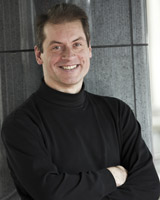
First violinist of Musica Vivax Wien, has played the violin since the age of four. At age of fourteen he was admitted to the University of Arts, Vienna, and at the same time he attended the Music Secondary School of Vienna. He has played with Klangforum Wien, Concentus Musicus Wien and the Wiener Kammerorchester and, since 1996, he has been a member of the Chamber Orchestra of Europe. He was the founder of Das Joseph Haydn Quartett, Wien (Primarius), with whom he has performed concerts, radio recordings, and chamber music projects. He has been the soloist in several ensembles all over the world, including Europe, Asia and the USA. He has contributed to a number of live TV and radio broadcasts, as well as CD recordings, for example, Deutsche Grammophone with Daniel Hope, and Camerata Tokyo. He has worked with Claudio Abbado, Martha Argerich, Ádám Fischer, Nikolaus Harnoncourt, Heinz Holliger, Herbert von Karajan, Gidon Kremer, Sir Roger Norrington, Murray Pereira, Julian Rachlin, András Schiff, Georg Solti, Christian Tetzlaff and Sándor Végh.
Continuo
Luis Zorita
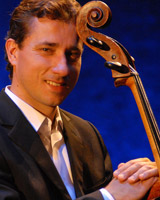
Luis Zorita was born in León, Spain. He completed his studies with honours in Chicago and Graz. He has taken part in several competitions and won first prizes in Spain, USA, Japan and Austria. He was solo cellist with Orquestra de Cadaqués, principal guest of the Niederösterreichische Tonkünstlerorchester and the Wiener Kammerorchester, guest musician of the Chamber Orchestra of Europe and the Mahler Chamber Orchestra, and cellist of the Merlin-Ensembles Wien. His career has included many invitations to perform at renowned festivals all over Europe, South-America, Asia, and the USA. As a soloist he has played cello concerts of Haydn, Elgar, Saint-Saëns, Lalo, Rodrigo, Brahms Double Concerto and the Beethoven Triple Concerto conducted by Sir Neville Marriner with orchestras in prestigious culture venues for example in Spain, Chicago, London, Ljubljana, Zagreb, Graz and Vienna. Several CDs, live concerts and master classes characterize his career.
Péter Kővári
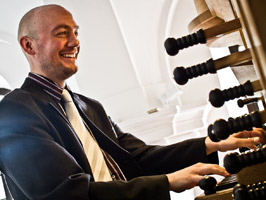
Péter Kővári was born in 1983, Székesfehérvár, Hungary. He completed his church music and instrumental studies in Vienna by Peter Planyavsky, Erwin Ortner and Jordi Casals, and continues to work on a PhD in music theory. He debuted in the Musikverein, Vienna in the role of the Spirit in Henry Purcell's Dido and Aeneas conducted by Nikolaus Harnoncourt in January, 2010. In the same year, he received a scholarship from the Tokyo Foundation for talented young artists. He has given several concerts as an organist, chamber musician and continuo player in countries throughout Europe, and has worked with István Bán since 2006. Together, they have performed several of the cantatas of J.S. Bach, Haydn and Mozart masses, and other oratorio works. Under the direction of Bán, he also played at the first oratorio performance Il Trionfo of the Hungarian Handel Society. A number of his concerts have been recorded by Hungarian Radio, and his first solo organ CD: Quod barocum vocatur was released in 2011.
Musicians
Musical Directors
István Bán
Violin
Christian Eisenberger
Markus Hoffmann
Anne Harvey-Nagl
Stephanie Baubin
Zsuzsanna Bolimowsky
Sophie Gansch
Ágnes Kertész
Éva Posvanecz
Christian Tachezi
Franz Pobenberger
Viola
Dorle Sommer
Teresa Nawara
Veronika Körmendy
Violoncello
Luis Zorita
Herwig Tachezi
Contrabass
Hermann Eisterer
Walter Bachkönig
Oboe
Emma Black
Fagott
Katalin Sebella
Trumpet
Balázs Winkler
Organ
Péter Kővári
News
Brahms-Saal Musikverein Wien
30.10.2014
Júlia Bányai – Sopran
| A. VIVALDI | Concerto grosso in D | RV 565 |
| G. MUFFAT | Concerto grosso „Dulce Somnium” | Nr.4 |
| A. VIVALDI | Motetto per soprano „Nulla in mundo pax sincera” | RV 630 |
| A. VIVALDI | Simfonia in C | RV 112 |
| G. MUFFAT | Concerto grosso „Delirium Amoris” | Nr.11 |
| A. VIVALDI | Motetto per soprano solo „Laudate pueri Dominum” | RV 600 |
